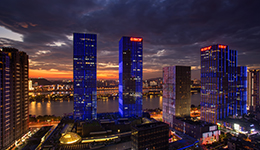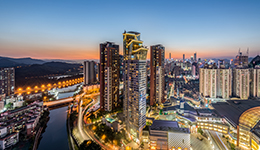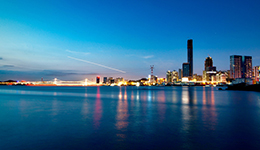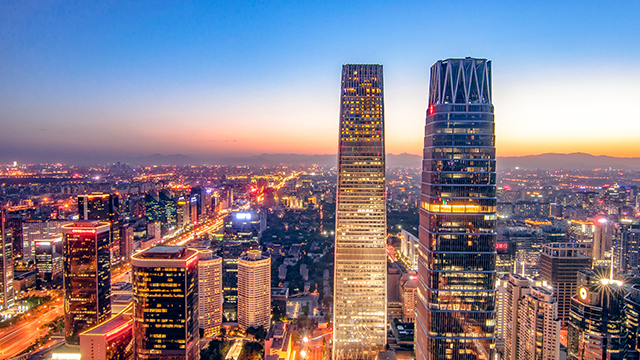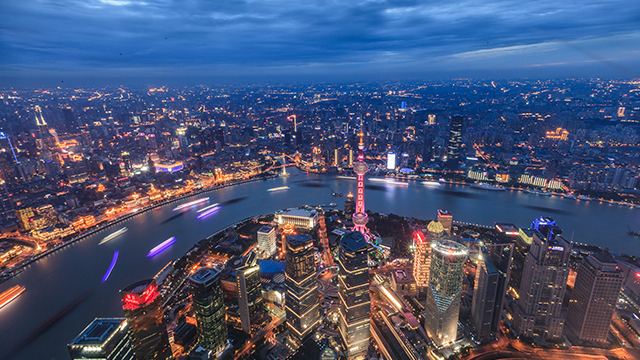
Hunan Issues Implementation Plan to Facilitate Yangtze River Economic Belt Development
The General Offices of the CPC Hunan Provincial Committee and the Provincial Government recently issued an “Implementation Plan for Hunan Province's Key Work in Deeply Promoting the Yangtze River Economic Belt Development (“Implementation Plan”). It responds to the idea of how to effectively “facilitate the development of the Yangtze Economic Belt by promoting well-coordinated environmental conservation and avoiding excessive development.” Thirty-three specific rules have been made, which define the task completion date and responsible departments.The “Implementation Plan” notes that it is important to take “water pollution remediation, water ecological restoration, and water resources protection” as the core to facilitate ecological environment conservation and restoration.By the end of December 2018, the following tasks will be completed:--Remediation and standardization in the construction of large-scale drain outlets;--Remediation of centralized drinking water sources in cities at or above the county level;-- Rectification of 33 black and odorous water bodies in urban areas, 76 in counties, and 41 in townships; and,--Clear away pulping capacity for paper making industry in places that surround the Dongting Lake, including Yueyang, Yiyang, Changde and Wangcheng.By the end of 2020, the proportion of water meeting excellent water quality in the national surface water assessment section will increase by 5 percentage points over that in 2017.An ecological conservation zone covering the entire "one lake, four rivers—Xiangjiang, Zijiang, Yuanjiang, and Lishui" basin will have been established. Ninety percent of the rural household waste in the province will be treated; and a basic daily cleaning mechanism established. More than 85 percent of the farmers will have sanitary washrooms.The “Implementation Plan” says that Hunan will take “ecological priority and green development effect” as an important reference for evaluating the overall performance of the Party and government leading groups and members; and for the reward, punishment, appointment and removal of officials. At the same time, provincial and municipal (prefectural)-level governments will regard it as an inspection. If responsibilities mentioned in the plan are not followed, and measures not working, officials at different levels should be accountable.Source: www.fdi.gov.cn
Hainan FTZ launches multi-billion projects
Hainan Free Trade Zone this week launched 100 construction projects with a total investment of 29.8 billion yuan ($4.29 billion) from local governments and enterprises in and outside of Hainan.A grand ceremony was held in Haikou, the capital city of China's southernmost Hainan province, on November 28 to mark the commencement of these projects.Located in major cities and counties around the tropical island, the projects include major infrastructure work such as the second-phase Haixiu expressway and the international convention and exhibition center in Haikou, along with industrial projects such as the China Shipbuilding Corp's deep-sea testing ground. Also included are projects aimed at improving community life in the region, such as the Sanya rural domestic sewage treatment project.A further 41 projects that will draw 34.2 billion yuan investment to Hainan were signed at the ceremony, among them the Sanya Deep Sea Science and Technology City, the SF Express Hainan port, the expansion of the CNOOC Hainan terminal, and the second phase of the Haidian Foreign Language Experimental School.Governor of Hainan province, Shen Xiaoming, speaking at the ceremony said that the launching of these projects in Hainan showed the province's commitment to high-level planning to promote valuable construction work.He said since construction of the Hainan Free Trade Zone was launched in April, major national and international enterprises have come to Hainan to show their interest in and support for the development of the Hainan Free Trade Pilot Zone, which was expected to show significant progress by 2020.Source: China Daily
Why Shenzhen can be ranked second in the World's Top Ten travel cities?
At the end of October, "Lonely Planet", the international travel guide that was regarded as the “Travel Bible”, published the Top Four best travel destinations in the world in 2019. Shenzhen ranked second in the World's Top Ten travel cities, becoming the only city in China to be among the Top Ten.Almost at the same time, the World Travel & Tourism Council (WTTC) released the latest report, “The Impact of Urban Tourism and Tourism in 2018”, which ranked according to the GDP contributed by the tourism industry. Shenzhen Tourism was shortlisted with a score of US$19 billion. Ranked Tenth in the world's top ten tourist cities.In Shenzhen's tourism GDP, the proportion of GDP from international tourism is about 35%. This data is 12% to 13% in Shanghai and Beijing.For these, the person in charge said that business travel has contributed.Shenzhen has always been an emerging modern city at the forefront of economic development. Frequent business travel activities have helped the rapid development of tourism in the entire city.As of the end of June 2018, there were 219 enterprises that listed in Fortune's top 500 companies in the world to conduct the deep-investment projects in China. Over 975 projects have been invested over the years, with a total investment of 93.291 billion US dollars and contractual foreign investment of US$200.75 billion, the actual use of foreign capital was 14.29 billion US dollars. Among the Shenzhen headquarters enterprises (139), there are 36 foreign-funded enterprises, accounting for 25%.Frequent business contacts between enterprises have brought teh huge flow of passengers to Shenzhen.In addition, the selection criteria for "Lonely Planet" provides us with another way of thinking about the attractiveness of urban tourism - Coordinated Development.As the only city in China to be ranked in the Top Ten, Shenzhen received a comment: a pioneering metropolis with a free spirit, rich in art, nightlife, musicals, and diverse dining and shopping.At the beginning of urban planning and construction in Shenzhen, all aspects of public cultural facilities, environmental space, and traffic roads were considered and reached international standards.Moreover, the development of Guangdong FTZ(Shenzhen Area) also attract more foreigners.
ABB's world-leading innovation and manufacturing base is operational in Xiamen
Headquartered in Zurich, ABB (Asea Brown Boveri Ltd.) is a global technology leading enterprise in power grids, electrical products, industrial automation and robotics and motion control. ABB Group has operations in more than 100 countries and regions and employs 147,000 people. ABB has a full range of business activities in R&D, manufacturing, sales and engineering services in China. Recently, ABB announced that the ABB Xiamen Manufacturing Center has officially opened in Xiamen. Dr. Shi Bifu, CEO of ABB Group, said: “ABB Xiamen Manufacturing Center is one of ABB's largest and most advanced manufacturing bases in the world. We have fully demonstrated the unlimited potential of Industry 4.0 through ABB's own factory. By integrating local business activities, we will better support the development of high-end industries in Xiamen and surrounding areas, and continue to contribute to China's reform and opening up."ABB Xiamen Manufacturing Center is one of ABB's investment projects in China recently. Last month, ABB announced that it will invest 150 million US dollars to build its world's largest and most advanced robotic super factory in Shanghai Kangqiao. In May this year, ABB's Robot Application Center in Chongqing officially opened, which the fourth Robot Application Center was established by ABB in China. Last December, ABB Shenzhen New Energy Technology Center was officially launched, focusing on the research and development of solar and electric vehicle charging solutions, and serving the global market. Since 1992, ABB's cumulative investment in China has reached $2.4 billion.
Beijing will relax the market access for foreign financial institutions
This year, Beijing will create a more attractive investment environment, significantly relax market access, study and formulate the expanding measures on the financial industry's opening for Foreign-fund Enterprises, and support foreign financial institutions to participate in the construction of Beijing's capital market.On the 25th, the State Council Information Office held meeting on “Accelerating the establishment of a fair competitive business environment”, the deputy mayor of Beijing, Wang Hong said. She revealed that this year Beijing will speed up the reform of the investment project commitment system and gradually realize the “zero approval” of corporate investment.Taking advantage of the expansion of the service industry, Beijing has continuously improved the level of international development and further relaxed the market access of foreign capital. In accordance with the unified requirements of the State, foreign investment fully implements the pre-entry national treatment and the negative list management system, and continuously reduces the negative list of the service industry. And will further expand the use of foreign capital.
The development of foreign investment in Shanghai will enter a new phase
First, there are fewer restrictions on market access. In particular, the opening up of the service sector will help introduce new technologies, new business formats, new business models and new products so as to give full play to the role of foreign investment in the development of the real economy.Second, with the deepening of the reform. We will implement the system of pre-establishment national treatment plus a negative list across the board while implement the national treatment after admission and treat all enterprises registered in our country equally.Third, support for innovation has been upgraded. System innovation in the pilot free trade zones pays more attention to giving greater autonomy to these zones. And more efforts have been made to explore the establishment of a free trade port so as to further demonstrate the piloting effect of foreign investment-related work in deepening the reform in an all-round way and opening up."Many aspects can be replicated. Different regions can compete with each other with more favorable policies, with more and better land. However, it takes a very high price to replicate business environment. It is not easy to replicate," Yang Chao, deputy director of the Shanghai Municipal Commission of Commerce said. He introduce that there are many such examples that companies moved out from Shanghai for lower-cost land and manpower, but later found that it is difficult to recruit high-caliber people. Even if they recruited the people they need, it is difficult to retain them because of the lack of good schools, good hospitals and good business districts.Shanghai has already done a great deal of work in urban construction and livable areas. Take the PM2.5 indicator for example. Shanghai has seen remarkable improvement over last year. Despite skyrocketing prices of land in Shanghai's downtown area, the government built many green spaces rather than tall buildings. Shanghai is determined to be built into a city of innovation, a city of humanities, and a city of green.Yang expressed his hope that the Shanghai Investment Promotion Organization (SIPP) will play a bigger role in promoting two-way investment in Shanghai. "First is policy-orientated and deliver policy information timely; second is demand-orientated and improve the effectiveness of investment promotion work; third is service-oriented and effectively serve the member institutions. The SIPP will present to the world a good story of China, of Shanghai, and let more foreign investors to understand Shanghai and to invest in Shanghai."Source: China.org.cn

Please leave us a message and we will get back to you shortly.

If you want to learn more information about investing in China, please leave your email address, we will send you the relevant information and article every month.
 0086-10-53270173
0086-10-53270173 china@tanikawa.com
china@tanikawa.com



